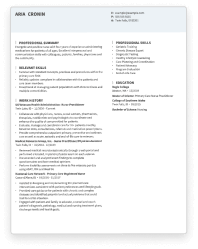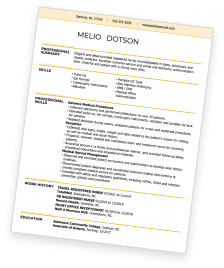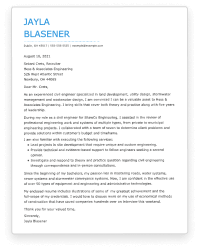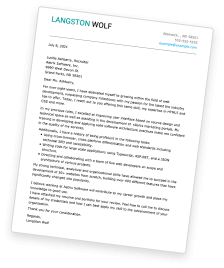Java Developer Resumes: Overview
As a Java Developer, your expertise lies in creating efficient, scalable software solutions. Your responsibilities include designing, implementing and maintaining Java-based applications that can be high-volume and low-latency.
Java developers ensure application designs conform to business goals and can be found in several industries and work environments, including;
- Startups
- Freelance
- Government
- Tech Consultancies
- Multinational Corporations
Successful Java developers must have an extensive range of skills, including proficiency in Java full stack developer skills and Java backend developer skills.
They must be familiar with application programming interfaces (APIs) and knowledgeable about DevOps principles. However, they also need soft skills such as teamwork, time management and empathy to work well with stakeholders.
At Hloom, we have plenty of high-quality Java developer resume examples that are sure to impress. Or, better yet, let your skills shine and save time by using our online resume builder to help you with your next Java developer job application.
For more resources, check out our downloadable resume templates and professional examples!
Java Developer Resume: Choose a Format
Crafting an impactful Java Developer resume starts with choosing the right format to showcase your unique skills and experience. You can choose between chronological, functional, or combination resumes.
In the highly competitive tech landscape, you need a resume that makes your qualifications stand out in the highly competitive tech landscape.
This section will guide you through the nuances of each format, ensuring your resume will effectively communicate your expertise and help you land the job!
Chronological Resumes for Java Developers
A chronological format is the most popular format for a Java developer resume. It focuses strongly on work history, making it an excellent choice for an experienced developer.
This format showcases your career growth from entry-level positions to your current advanced expertise. Highlighting your work history provides a comprehensive view of your professional development in Java development.
In a chronological resume, you will list your previous roles in reverse chronological order, providing your job title, employer’s name and location, and the dates of employment.
Then, under each job entry, use bullet points to detail job responsibilities and accomplishments and highlight your relevant Java development skills.
Functional Resumes for Java Developers
A functional resume can be a powerful tool for Java developers just beginning their career or those transitioning from a different field. This format emphasizes your skills and achievements, allowing you to showcase your expertise rather than your work history.
By focusing on competencies rather than your previous employment, this format enables you to draw attention to the specific skills that make you a valuable asset in the Java development landscape.
However, a functional format does have some limitations. It is incompatible with most applicant tracking systems (ATS), meaning your resume might not reach hiring managers using automated applicant screening systems. Also, many employers place a high value on professional experience.
Combination Resumes for Java Developer
A combination resume merges the best elements of both chronological and functional formats. It focuses equally on your work history and skills, meaning you can present a comprehensive view of your capabilities as a Java developer.
This format is a good choice for Java developers with limited or unrelated job experience, as it prominently displays your skills and qualifications before delving into your work history, highlighting your ability to do the job.
Choosing a Resume Format
Choosing the right resume format is critical in effectively presenting your Java Developer experience and getting the attention of hiring managers.
If you aren’t sure which format is best for you, experts recommend using a chronological format for your Java developer resume.
Even if you don’t have relevant work experience, you can tailor each section of your resume to showcase transferable skills and technical knowledge.
You can also include additional sections highlighting special training, certifications or coursework to demonstrate your knowledge of software development.
In this way, you are doing your best to showcase your most important qualifications in Java development!
How to Write a Java Developer Resume
Once you have chosen a resume format, you can begin writing your resume for Java developer jobs. To start, create a resume outline that includes five standard sections:
- Contact Information
- Professional Summary or Objective Statement
- Work History
- Skills
- Education
Then, if space allows, you can consider including additional sections to fill out your resume and showcase your abilities.
Knowing how to write an effective resume is critical to getting the Java developer job you want, so let us explore each section more closely.
Contact Information
Like any resume, start off by listing your contact information. Include your full name, location, phone number and professional email.
You can also include your LinkedIn or Github profile or link to an online portfolio showcasing your Java projects.
Your contact information should be placed prominently at the top of your Java developer resume so recruiters can find it easily. Use a readable font, double-check for typos, and If you include a link to an online profile, be sure that it is up to date.
Summary or Objective
Next, you will craft a professional summary or objective statement for your Java developer resume. This is a brief introduction to your resume, and it is a pivotal step in creating a compelling narrative.
Although they serve a similar purpose, there are critical differences between a professional summary and an objective statement.
A resume summary highlights your level of experience and most relevant Java development skills. It is best suited for an experienced Java developer.
A professional summary for a Java developer might look like this:
“Results-driven Java Developer with over 5 years of experience in designing and implementing high-performance applications. Proven track record of delivering innovative solutions that enhance overall system efficiency.”
Alternately, an objective statement conveys your career aspirations within Java development. It is a good choice for someone just starting their career or without relevant work experience.
For example, an effective objective statement might look like this:
“Seeking a challenging role in a dynamic tech environment where I can leverage my expertise in Java development to contribute to cutting-edge projects and foster professional growth.”
Whether you choose a summary or an objective statement, customizing this section to align with the job description will enhance your resume’s appeal and capture the recruiter’s attention. Keep this section concise and focused on the job you want.
It should be no more than two or three sentences long and include keywords from the job posting to pass initial screenings by ATS.
Work History
Next, structure the work history section of your Java developer resume. This section is an opportunity to showcase your professional experience in a compelling manner. For each job entry, go beyond mere job descriptions and highlight your tangible contributions.
Each job entry should include your job title, employer name and location, and the dates you were employed, such as:
Java Developer | ABC Financial Services, New York, NY | May 2019 – Dec 2021
Then, underneath each job entry, use bullet points to highlight achievements, responsibilities, and the overall impact of your work to give recruiters a clear understanding of your value proposition.
Use action verbs and quantify your responsibilities and achievements where possible to engage the reader, providing a comprehensive view of your role and contributions in each position.
Quantifiable responsibilities and achievements are particularly important because they demonstrate your value as a Java developer, especially if you can clearly connect how your responsibilities had a direct impact on your organization.
For instance, your job entries might look like:
- Developed a real-time fraud detection system using Java and Spring Boot, resulting in a 25% decrease in fraudulent transactions.
- Implemented RESTful APIs to connect the customer portal with external financial systems, improving data accuracy and reducing manual errors by 20%.
- Conducted regular code reviews and introduced best coding practices, leading to a 15% improvement in overall code quality.
Skills
Next, you will create a dedicated skills section providing a snapshot of your capabilities as a Java developer. Again, this section should be tailored to the specific job you are applying to.
Focus on skills aligning with the job description and showcase your software development knowledge.
Your skills section should include technical skills like writing clean, readable Java code and soft skills like communication and teamwork.
Employers look for well-rounded candidates who are not only technically proficient but also able to work well with others.
To help you get started, we have compiled a list of the top hard and soft skills employers look for in a Java developer:
Top 5 Hard Skills for Java Developer Resumes
- Java Programming: Mastery of Java programming is fundamental for a Java developer. This skill ensures efficient coding, robust application development, and seamless integration of Java technologies, making it a cornerstone for success in this role.
- Spring Framework: Proficiency in the Spring Framework is crucial for building scalable and modular Java applications. This hard skill empowers developers to enhance the efficiency of their code, implement enterprise-level solutions, and streamline the development process.
- RESTful APIs: A firm grasp of designing and implementing RESTful APIs is essential for Java Developers. This skill enables seamless communication between software system components, ensuring efficient data exchange and integration with external services.
- Database Management (SQL/NoSQL): Database management skills, encompassing both SQL and NoSQL databases, are vital for Java Developers. This computer skill allows for effective data storage, retrieval, and manipulation, ensuring the smooth functioning of data-driven applications.
- Agile Methodology: Proficiency in Agile Methodology is a crucial hard skill for Java Developers. This approach facilitates collaborative and iterative development, ensuring adaptability, quick response to changes, and efficient project delivery.
Top 5 Soft Skills for Java Developer Resumes
- Problem-Solving: Problem-solving skills are paramount for Java Developers who often encounter complex coding challenges. The ability to analyze issues, devise effective solutions, and troubleshoot efficiently ensures the smooth development and maintenance of Java applications.
- Collaboration: Collaboration is a critical soft skill for Java Developers working in team-oriented environments. Effective collaboration fosters knowledge sharing, efficient project execution, and the creation of high-quality software through the collective effort of the development team.
- Communication: Strong communication skills are essential for Java Developers to convey complex technical concepts, discuss project requirements with stakeholders, and collaborate effectively within cross-functional teams. Clear communication ensures alignment in project goals and successful implementation of software solutions.
- Adaptability: Given the dynamic nature of the tech industry, adaptability is crucial for Java Developers. The ability to quickly grasp new technologies, methodologies, and project requirements allows developers to stay relevant and excel in a fast-paced development environment.
- Attention to Detail: Attention to detail is a foundational soft skill for Java Developers, ensuring precision in coding, thorough testing, and identifying potential issues before deployment. Meticulous attention to detail contributes to creating reliable and high-performance Java applications.
Education
Next, you will provide your educational background. Java developers can have various educational backgrounds, and employers will want to know about your degrees and relevant training.
Most Java developers will have a bachelor’s or master’s degree in computer science, computer engineering or other related field.
List your highest degree obtained, the name of the school or university, and its location. You can also include relevant coursework or any awards or honors you have received.
Your education section may look something like this:
Bachelor of Science: Computer Science
XYZ University | Denver, Colorado
Additional Sections
Once you have crafted the previous five sections, consider enhancing your Java developer resume with some optional sections.
Java developers can make their resume stand out by including sections such as:
- Certifications
- Professional Associations
- Project Portfolios
- Awards
- Volunteer Experience
If you choose to include additional sections, ensure they are relevant to the Java development job you are applying to.
Focus each section on the value you bring to a potential employer.
Top Certifications For Java Developers
Including certifications on your resume is an excellent way to validate your expertise in software development and demonstrate your commitment to keeping your skills sharp over time.
Obtaining Java certifications can expand your capabilities and give you a competitive edge.
- Oracle Certified Professional, Java SE 8 Programmer: This certificate validates your programming knowledge and covers topics like Java data types, string class, decision statements, looping statements, methodologies, constructors and classes.
- Spring Professional Certification: This certificate demonstrates your expertise with the features of Spring and Spring Boot, showing employers you can apply Spring’s features to build and deliver production-ready applications.
- AWS Certified Developer: Because many applications are migrating into the Amazon cloud, this certification will show employers you can integrate your applications with AWS services.
Tips For Writing A Java Developer Resume
Tailor your resume to match the job description:
Tailoring your Java developer resume involves aligning your skills and experiences with the specific requirements outlined in the job description.
Demonstrating a clear connection between your expertise and the job requirements significantly enhances your chances of standing out in the application process.
Highlight specific Java technologies and frameworks:
Provide a detailed breakdown of the particular Java technologies and frameworks you are proficient in. For instance, instead of merely stating “Java,” specify your expertise in Java EE, Spring Framework, and Hibernate.
This granular approach showcases your depth of knowledge and helps recruiters assess your compatibility with their tech stack, making your resume more impactful in a competitive tech landscape.
Quantify achievements with measurable results:
Enhance the impact of your Java developer resume by quantifying your achievements. For example, highlight how you improved application performance, reduced response times, or enhanced system efficiency.
Including numbers and percentages provides concrete evidence of your contributions and adds a layer of credibility to your resume.
Showcase problem-solving and analytical skills:
As a Java developer, strong problem-solving and analytical skills are paramount. Illustrate your ability to tackle complex challenges by sharing specific instances where you identified and resolved issues in your previous roles.
Whether it’s optimizing code for better performance or debugging intricate software problems, demonstrating your analytical prowess adds depth to your resume and reassures recruiters of your problem-solving capabilities.
Include relevant keywords for applicant tracking systems:
Optimize your Java developer resume for applicant tracking systems (ATS) by strategically incorporating relevant keywords. Identify key terms from the job description and integrate them into your resume.
Emphasize collaboration and teamwork:
Emphasize your collaborative nature and teamwork skills, which are vital for success in Java development projects. Share instances where you collaborated with diverse teams, contributed to successful project outcomes or facilitated knowledge-sharing sessions.
Keep your resume concise and focused:
Ensure that every section of your Java developer resume contributes directly to showcasing your qualifications and suitability for the role. Avoid unnecessary details and prioritize impactful content, allowing recruiters to grasp your key strengths and experiences quickly.
A concise and focused resume is not only more appealing but also reflects your ability to communicate efficiently, a valuable trait in the tech industry.
Proofread for errors and consistency:
Review your resume carefully to ensure it is error-free and maintains a consistent tone. Check your document for grammatical mistakes, typos, and formatting inconsistencies. A polished and error-free resume reflects your attention to detail, a quality highly valued in Java development where precision is crucial.
Helping Job Seekers Like You


Save Time With Our Resume Builder
Key Takeaways
- Tailoring your Java developer resume to the job description increases your chances of passing initial screenings by ATS and hiring managers.
- Choose the right resume format based on your career progression and goals.
- Include a compelling summary or objective to grab attention.
- Emphasize key Java developer skills and quantify achievements in the work history section.
- Enhance your profile with relevant Java developer certifications and education.
Save Time With Our Cover Letter Builder












